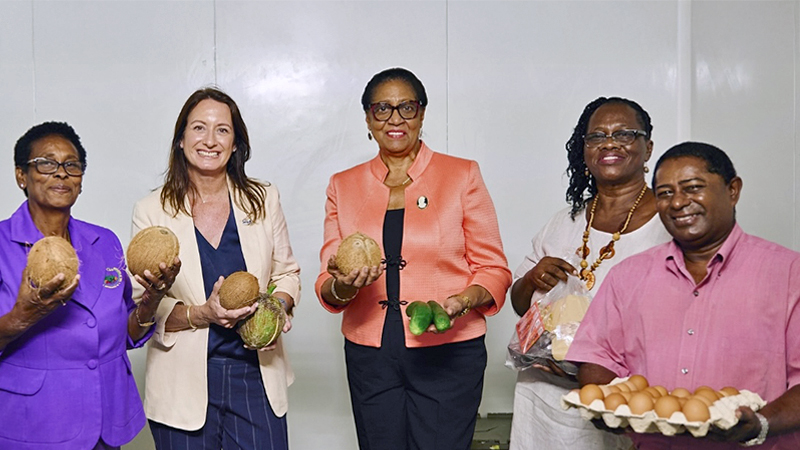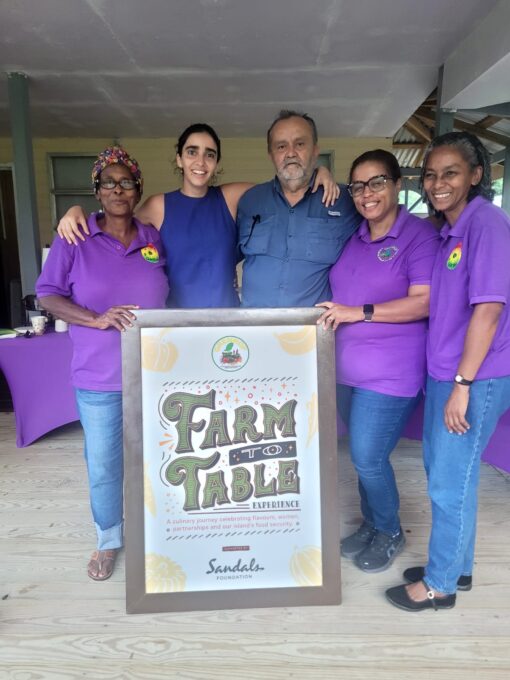St. DAVID — In a historic moment for Grenada’s agriculture sector, the Grenada Network of Rural Women Producers (GRENROP) has unveiled the island’s first-ever coconut agroprocessing facility, marking a major milestone in women-led enterprise, rural development, and sustainable agriculture.
Officially opened on April 3, the EC $1.2 million state-of-the-art plant in La Sagesse, is now fully equipped to produce coconut flour, virgin oil, flakes, and cosmetics. Designed to serve both the hospitality industry and local markets, the facility includes a cutting-edge chill room to preserve raw and processed goods- crucial for meeting quality standards in the expanding agroprocessing industry.
“This facility allows us to purchase significantly more produce from both our members and non-members,” said GRENROP President Theresa Marryshow, MBE. “We can now consistently supply hotels, restaurants, supermarkets, and anyone seeking high-quality, locally made coconut products.”
A Grassroots Movement, Decades in the Making
GRENROP’s story began more than 30 years ago, rooted in a 1990 regional survey by the Inter-American Institute for Cooperation on Agriculture (IICA), which revealed that Caribbean women- though often overlooked-were the true backbone of farming. In Grenada, this revelation sparked a movement.
With support from IICA, local women farmers began meeting weekly to formalize their participation in the agricultural sector. By December 2000, GRENROP was officially launched with 100 registered members. The group was also part of a wider Caribbean initiative to form national networks of rural women producers.
Among the early leaders was Agricultural Officer Theresa Marryshow, who helped establish GRENROP’s foundation and represented Grenadian women farmers at a pivotal meeting in Guyana. Her ongoing leadership continues to drive the organisation forward.
Today, GRENROP comprises 75 women farmers between the ages of 40 and 75, alongside 12 male members and four full-time youth farmers under 35. Even the next generation is being nurtured- three girls under the age of 10 have already been registered by their parents.
Expanding Membership, Broadening Impact
To meet rising demand from hospitality partners like Sandals, Six Senses, Silversands, Calabash, and Alexis Supermarket in Carriacou, GRENROP amended its constitution three years ago to include men and youth. This strategic move has allowed the network to scale its production and partnerships across sectors.
The coconut agroprocessing plant is the latest outcome of a series of collaborations. The Ministry of Agriculture, Chinese Agricultural Mission, World Bank’s AGRICOM project, and the International Trade Centre (ITC) all contributed to its development. ITC, in particular, helped refocus the facility’s layout toward value-added coconut by-products, rather than just raw produce.
The Sandals Foundation donated EC $267,000 to furnish the building with stainless steel equipment, while the Government of Grenada provided EC $76,000 for a chill room and infrastructure upgrades. The Ministry of Agriculture has also earmarked EC $500,000 in the 2025 budget to establish an agroprocessing desk and expand initiatives island-wide.
A Model of Integrated Agriculture
Beyond processing, GRENROP manages a nursery in St. Patrick-run by a female farmer-and the organization is involved in replanting efforts to restore Grenada’s coconut supply post-Hurricane Ivan. Their model promotes a full-circle ecosystem where hotel chefs visit farms, share culinary insights, and help develop premium dishes using locally sourced ingredients.
Heidi Clarke, Executive Director of the Sandals Foundation, highlighted the broader significance: “We celebrate the accomplishments of a group of very industrious women in an industry largely dominated by men. GRENROP has changed the narrative by empowering women with knowledge, technology, and access to decision-making.”
Looking Ahead
While exports are not yet underway, the facility is expected to serve as a launchpad for regional and international growth. For now, the focus remains on local supply, community impact, and building a legacy rooted in sustainability, inclusiveness, and empowerment.
What began as a conversation over three decades ago has become a transformative movement-proof that when women are equipped with the right tools and trust, they not only grow crops, but they also grow communities and economies.










